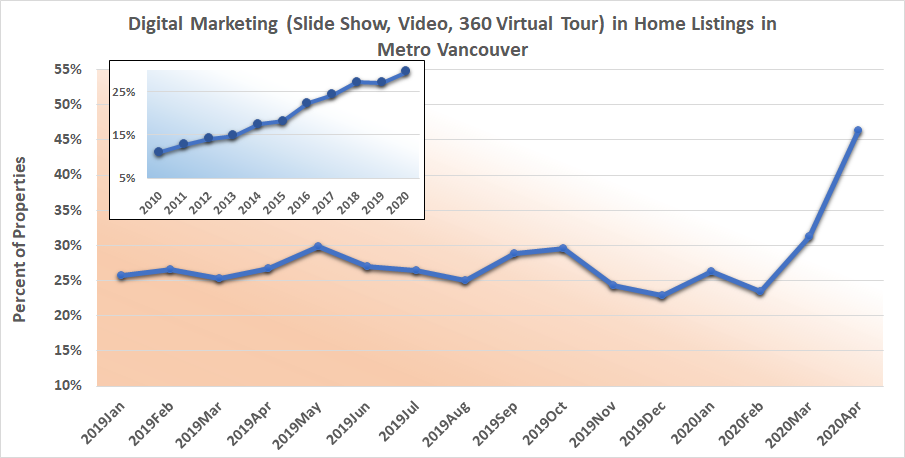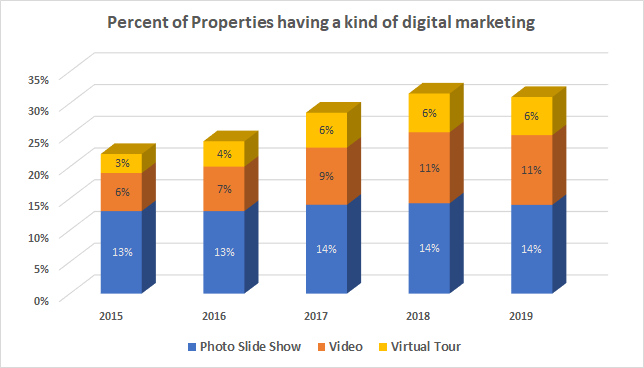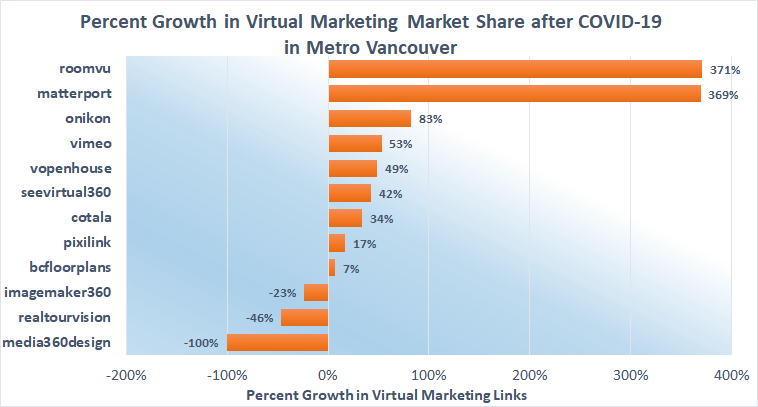Prior to the COVID-19 outbreak, only 24% of residential listings used links to virtual tours. After the pandemic’s initial impact 43% of listings relied on the use of virtual tours — and that number continues to grow.
KEY FINDINGS:
- Pre-COVID-19, 24% of listings linked to some kind of virtual tour, this jumped to 43% after the outbreak.
- Real estate listings are now using a variety of digital marketing techniques, such as slide shows, videos and 360 virtual tours.
- Matterport.com, a leading 3-D virtual tour provider, grew its market share by 369% in March and April 2020
Given the unprecedented health crisis, all businesses in the Greater Vancouver area, across the country and around the globe have been impacted. While construction and real estate were two industries that were declared essential services, real estate data shows a significant drop in sales activity starting in mid-March 2020. Social distancing rules and decisions to self-isolate meant that fewer buyers were viewing properties and fewer viewings meant fewer sales.
Almost immediately, there were predictions of a housing market crash. How could Vancouver’s real estate market suffer through social distancing when property purchases were such a hands-on process? But the market is resilient and its stakeholders resourceful.
Turns out, one of the key tools to helping the real estate market weather the impact of COVID-19 measures was the use of online and virtual technology. Through the use of virtual strategies, agents were able to continue selling and marketing homes in spite of social distancing requirements. Technology like 360 degree-photography and Matterport videography allow buyers to tour virtual open-houses and examine properties without being physically present in the home.
Roomvu collected data on more than one million listings from the MLS database to examine trends in digital marketing for Metro Vancouver. The data reveals that from 2010 to mid-April 2020, there was a 370% increase in the use of digital and online marketing, which includes photo slideshows, videos on YouTube and Vimeo, and virtual tour pages.
Previous research conducted by Roomvu found that the average number of photos used in property listings in the Greater Vancouver area increased from only one in 2010 to 15 in 2019. Virtual tours, slideshows, and videos posted on Youtube or Vimeo have also dramatically increased. Roomvu collected data on more than one million listings from the MLS database to examine trends in digital marketing in recent years.

Analysis of digital marketing shows that there are three main categories for this type of promotion: photo slideshows, videos, and virtual tours.
In 2015, 18.1% of all properties listed for sale in Metro Vancouver used at least one type of digital marketing, of which approximately 3.4% were dedicated to some form of virtual tours. By 2020, just under 30% of properties used at least one type of digital marketing, with virtual tours making up 7.3% of these marketing efforts.

How listings are being marketed changes due to COVID-19
To dig further into this presumption, data was separated into pre- and post-outbreak timeframes and examined to measure effects on open-houses and viewings by searching for keywords like “Corona”, “COVID”, “Open-House”, “Virtual” and others. As expected,
To appreciate how social distancing and self-isolation has impacted the marketing of real estate properties, Roomvu analyzed terms used in real estate listing pre-pandemic and post-pandemic.
- Pre-outbreak, the term “virtual” appears in just 1.3% of all listings
- Post-oubreak, this term was used in more than 6% of residential listings.
- Pre-outbreak, the term “open house” was used in 14% of listings
- Post-outbreak, the use of this term dropped to just 4% in all residential listings.
- . Note: this analysis removed words like “open house cancelled,” “no open house,” and “virtual open house,” so as to not confound the findings.
These results point to an appreciable increase in digital marketing in the period following the outbreak. Before the COVID-19 pandemic, only 24% of listings used a type of digital marketing in Metro Vancouver, with that number increasing to 43% after the outbreak. Total listings in Greater Vancouver, Fraser Valley and Chilliwack areas also followed a similar trend with 28% using a form of digital marketing pre-pandemic, which increased to 38% of listings using a form of digital marketing post-pandemic.
Virtual tour technology is poised to grow in 2020 and beyond
The growth in market share of several of the main service providers of virtual tours is poised for growth in 2020. As a leading provider of this marketing technology, is shown in Figure 3. Roomvu, for example, grew its market share of the market by 371% in 2020, while Matterport.com, a leading 3-D virtual tour provider, grew its market share by 369%. Conversely, providers like Realtourvision and Media360Design have not seen increases in their share of the market as a result of COVID-19.
YouTube and Matterport.com have the highest market share in virtual tour links in 2020.

While, the long term impacts of the COVID-19 pandemic are impossible to predict,one impact that appears to have staying power is the use of virtual replacements for everyday tasks and services. The real estate market in Vancouver has shown a significant increase in the adoption of virtual marketing strategiesWhile the adoption of this technology was certainly accelerated by the pandemic crisis, our analysis shows that the use of this technology was already on the rise over the last five years. . While we don’t predict the demise of the in-person open house or property tour, we do anticipate that digital marketing will increase in importance and will continue to be adopted and used by various stakeholders in the real estate industry.
Methodology
Roomvu analyzed data from the Greater Vancouver Real Estate Board Multiple Listing Service (MLS), in April 2020. More than one million listings from this database were used to examine trends in digital marketing for Metro Vancouver. Also realtors’ digital marketing links to 43 most popular websites were considered as the base for virtual marketing counts in this report.
About Roomvu
Roomvu is a professional real estate marketing and analytics platform built specifically with Real Estate Agents in mind. The data scientists at roomvu look at in depth analytics of real estate data and trends. The research with Prof. Tom Davidoff of University of British Columbia Sauder School of business, has enabled the team to ask and query fundamental questions about future of real estate transactions here in vancouver.
About Matterport
Matterport is the leading spatial data company focused on digitizing and indexing the built world. Our all-in-one 3D data platform enables anyone to turn a space into an accurate and immersive digital twin which can be used to design, build, operate, promote, and understand any space.

Responses